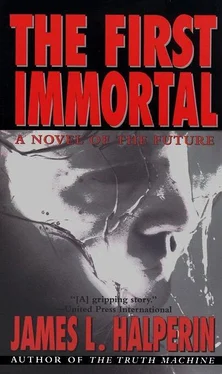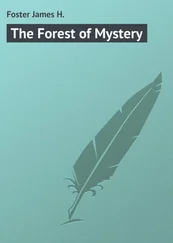“That’s what I mean,” Ben said. “If we get to choose our offspring’s traits, we could have all the benefits of evolution, even if nobody ever died. It’s called eugenics; surely you’ve read something on the subject.”
“Yes, but it’s not natural,” Sally said.
“Good! Like I said, nature is our adversary. Fact is, a natural life expectancy for us may only be fifteen or twenty years.”
“Really?” Marge asked.
“That’s about how long they think the average caveman lived,” he explained, “before there were medicines and doctors. You have to remember, we’re talking a truly all-natural life span, when lots of us died from being eaten!”
“Are you saying there’s no difference between saving yourself from a cave lion by using a spear, and saving yourself from a disease using medicine?” Marge asked.
“Oh, sure,” Ben said, “they’re plenty different all right, but fundamentally speaking, isn’t the effect the same?”
“I suppose it is.”
“So how can anyone say that even a hundred years is enough?” Ben asked. “If a long life is good, and good life can be long, why isn’t victory over death even better?”
December 7, 1941
In a desperate need to escape the household fireworks, Toby had told his parents he was going to church with Ben. Because it was Ben, he knew they’d allow it. There was just one problem of which Mr. and Mrs. Fiske remained blissfully unaware: Ben rarely went to church.
Instead the two boys passed time on Ben’s back stoop, talking and listening to the radio music blaring through an open kitchen window. It was really too cool to sit outside, but too sunny not to. They’d been talking since gobbling down the chicken sandwiches Alice Smith had made them.
The music suddenly stopped, and the airwaves filled with static. Without knowing why, Ben glanced at his watch: 1:25 P.M.; a time that would be imprinted in his memory. Then a voice came on with astonishing clarity:
“At 7:55 A.M. local Hawaiian time, just a half hour ago, the Imperial Japanese armed forces attacked the U.S. Pacific Fleet in Pearl Harbor. The attack is ongoing. While specific battle reports are not yet available, it appears we have sustained significant losses. We will bring you more as it becomes available. God bless America.”
The two boys sat staring at each other as the music resumed. Now it was martial, not band, music, which faded again within seconds.
“The President of the United States, Franklin Delano Roosevelt…”
Ben had never heard of Pearl Harbor, but grasped what the attack meant to him.
FDR, in his poetic style and nasal, grandfatherly voice, briefly addressed the American public. The reception was poor, punctuated with static. The two boys strained in silence to capture the words. By the time the President finished, Ben had made his decision.
“The Japs made a big mistake,” he said to his friend. “That bombing’s gonna unite this country, get everyone in America solidly behind this war. I guess college’ll have to wait awhile, for me, anyway. Next month I turn seventeen; I’ll volunteer for the Navy.”
January 14, 1942
Toby grasped the push bar and swaggered into the Colonial Spa. He plunked himself onto the stool beside Ben at the lunch counter. Outwardly, his manner was that of a man full of confident anticipation. But beneath, a frightened child trembled.
“Sorry I’m late. So much to do, you know.”
“You’re not late,” Ben told him evenly. He stirred his coffee, a recently acquired taste. Although this was Ben’s seventeenth birthday, his mood hardly seemed festive.
Tomorrow Ben would enlist; Toby already had, weeks ago. Over the last several days, the two boys had found no time for each other. It felt as if the world as they knew it had spun out of their grasp. Most of the adult population of North America viewed the times with similar impotent apprehension.
“Can’t stay long,” Toby said. Ben nodded stoically.
“I know it’s your birthday,” Toby continued, “but I have to tell my parents today, and that could be a real pisser.”
“Tell your parents what?”
“Huh? That I’m going in the Army, of course,” Toby said. “Oh hell, Ben,” he blurted, “this really is one pisser of a day. I can’t believe I never told you: I, uh, signed my father’s name to my enlistment papers. Traced it right off one of his canceled checks.”
If Ben displayed any surprise at all, it could be detected only in a slight widening of his eyes.
Toby broke the silence. “You might not believe this, but the truth is, I just forgot to tell you.”
“Of course I believe you,” Ben said, his tone revealing more: grudging admiration, and doubts about whether he himself would have had the rocks to do anything so brazen. “Shit. Should’ve occurred to me, pal. Ol’ Ted woulda done just about anything to keep you home.”
“You got that right. Anything short of having me arrested for forgery, that is.”
Ben laughed, a knee-jerk of nervous sympathy for Toby’s predicament and approval of his clever tactics. Both realized that Toby’s parents would ultimately relent. It wasn’t like they had any choice.
The boys sat in quiet contemplation.
“What do you think happens when you die?” Toby offered at last.
“Heaven, I suppose,” Ben said. “Or maybe nothing at all.”
“Nothing? How could that be?” Toby asked. “Everyone believes in heaven.”
“Christians do,” Ben said, “and Moslems believe in paradise, but Hindus think we return to earth as other people, or even animals. Reincarnation. Big deal, if you can’t even remember who you were before. Fact is, nobody really knows what happens when you die. Not even priests.”
“I guess we need to believe it doesn’t just end, don’t we?” Toby said.
“Guess so,” Ben said. But what if there really was nothing else? he thought. What if everyone simply died, and then there was nothing else at all?
“Well, you’re lucky you’re joining the Navy,” Toby said.
“How’s that?”
“Well, when the shooting starts for me, some friggin’ Nazi’s probably gonna be doing it up close with a Mauser or a Luger. But you, you lucky S.O.B., you’ll no doubt be nestled down inside some big battleship or heavy cruiser. You won’t have a care in the world. Unless you get a torpedo up your ass.”
Ben laughed, but the sound echoed hollow.
Toby let it pass.
Down in the hold. Dark. Close. Putrid and suffocating. Ben even imagined hearing the whoosh of a torpedo charging through black waters, possessed of a special grudge against one Benjamin Franklin Smith. He shuddered and for the first time questioned his choice of military service.
Toby squinted as though, having realized he’d upset his friend, he was now searching his head for words to salvage their encounter. “The last thing we read in English class was Julius Caesar ,” he started, slapping Ben’s shoulder, a fraternal tap.
Ben gazed back with shrewd interest.
“Yeah,” Toby continued. “Remember how at the end, Cassius and Brutus are about to go into battle? Kinda like us; which I guess was why it stuck with me. ‘O! that a man might know the end of this day’s business ere it come.’”
“And come it will.” Ben looked straight into his friend’s eyes and paraphrased from the verse before it: “‘Farewell, Tobias. If we do meet again, why, we shall smile.’”
Toby pulled a rabbit’s foot—his lucky rabbit’s foot—from his pocket, presented it to Ben, then solemnly finished, “‘If not, why then, this parting was well made.’”
The rabbit’s foot, purchased at Woolworth’s for five cents, was grimy and reeking of six years spent in Toby’s pocket. Each boy had a different idea about the powers of good-luck charms: They represented everything to Toby, and nothing to Ben.
Читать дальше












